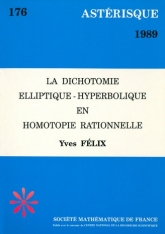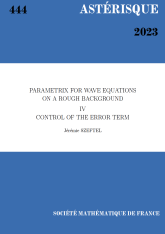La dichotomie elliptique-hyperbolique en homotopie rationnelle
La dichotomie elliptique-hyperbolique en homotopie rationnelle

- Consulter un extrait
- Année : 1989
- Tome : 176
- Format : Électronique, Papier
- Langue de l'ouvrage :
Français - Nb. de pages : 189
- ISBN : ISBN-13 978-2-85629-502-1
The homotopy groups $\pi_{i}(X)$ of a $1$-connected finite space $X$ are finitely generated abelian groups. They can be written : $\pi_{i}(X) = \mathbb{Z}_{ni} + T_{i}$, where $T_{i}$ is a finite group. There are then exactly two possibilities, either all the ni except a finite number are zero, or there is an infinite sequence of nonzero $n_{i}$. This naive dichotomy is fundamental and its description is the object of the text. If a space is elliptic, then its Euler-Poincare characteristic is non negative and its cohomology satisfies Poincare duality. Moreover, all the ni are zero for $i$ greater or equal to two times the dimension of the space. On the other hand, if $X$ is hyperbolic, then the sequence $\sum_{i\leq r}ni$ has an exponential growth. The graded rational vector space $\pi_{*}(\Omega X)\otimes\mathbb{Q}$ inherits a natural structure of graded Lie algebra. The fundamental theorem of the texts concerns its structure : In fact, the depth of this Lie algebra is less or equal to the category of the space. This fact leads us in a natural way to the study of graded Lie algebra of finite depth. We prove for instance that these Lie algebras are solvable if and only if they are finite dimensional.


